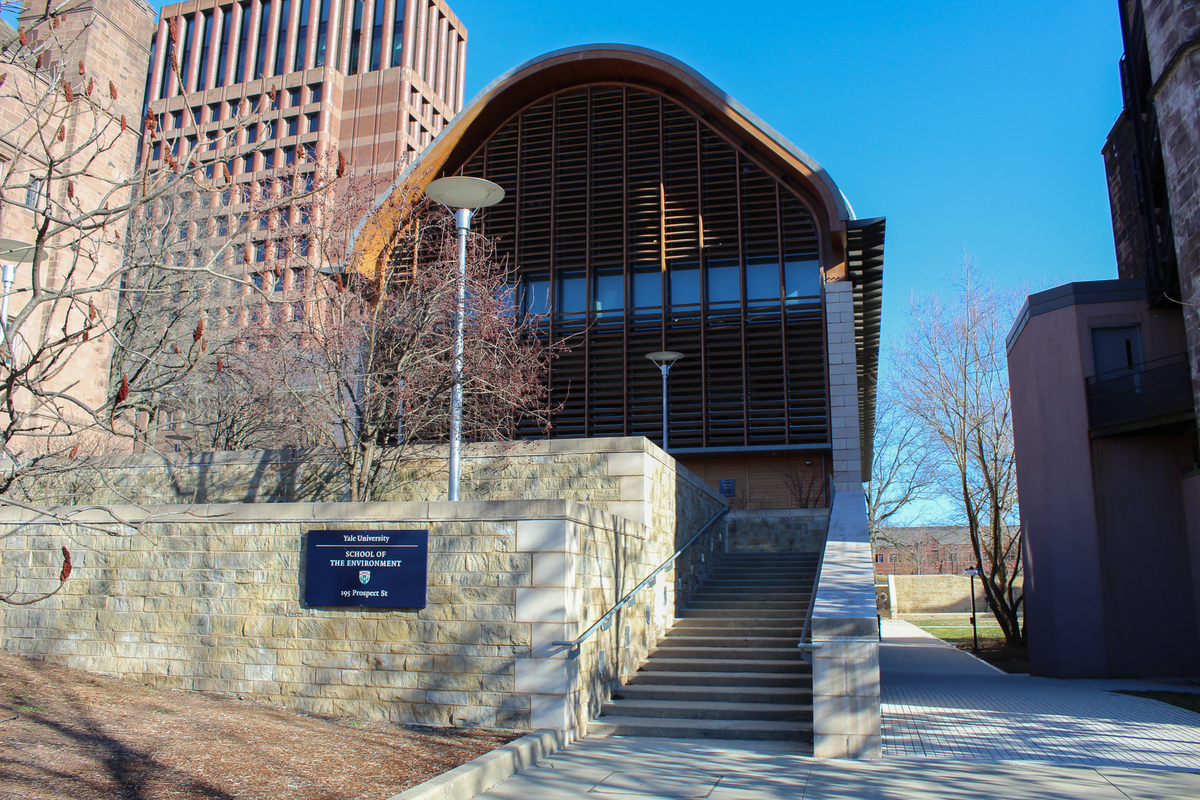School of the Environment certificate program sets its sights on urban sustainability
Yale School of the Environment’s new“Urban Climate Leadership” certificate program will provide students with a survey of the challenges and solutions that come with guiding cities toward the future.

Paul-Alexander Lejas, Contributing Photographer
A new School of the Environment certificate program is delivering climate education beyond Yale’s campus.
Unveiled last month, YSE’s new “Urban Climate Leadership Certificate Program” started accepting applications for its first cohort on March 1. The nine-month virtual certificate program — focusing on the relationship between urban spaces and the climate crisis — joins two others aimed at supporting mid-career professionals in the Global South.
“We really hope that this is an opportunity to both learn about the myriad ways that cities contribute to climate change and are impacted by climate change,” said Cameron Kritikos DIV ’23 ENV ’23, Urban Climate Leadership program manager. “The speed and scale of urbanization, and the concurrent deterioration of our planetary system, demands swift and scalable solutions.”
Kritikos explained that the 36-week curriculum will encompass five themes: urbanization and climate change, adaptation solutions, carbon accounting, governance and implementation. The fully remote program will guide its 50-member cohort through a survey of current urban climate challenges, policy initiatives and new opportunities.
According to Colleen Murphy-Dunning, a School of the Environment lecturer and program staff member, the coursework will consist of 36 weekly modules, each of which involves faculty-led seminar discussions paired with an hour of asynchronous lecture by climate leaders from around the world. Intended to offer students a variety of perspectives, the program’s slate of lecturers ranges from IPCC authors to nonprofit leaders and Yale professors.
After nearly a year of development, the program looks to address a growing area of climate interest.
“Urbanization is one of the megatrends of the 21st century, and cities are at the front lines of climate change,” Karen Seto, School of the Environment professor and director of the Hixon Center for Urban Sustainability, wrote in an email to the News. “There is an urgent need to develop leaders who can help cities both mitigate and adapt to climate change.”
Asha Ghosh, Urban Program manager at the School of the Environment and a lecturer at the School of Management, said that the program’s emphasis on urban spaces navigates the complex dynamics between our urban centers and the warming climate. Urban spaces are the largest contributors to global carbon emissions, but they also present some of the foremost opportunities for new climate solutions, she added.
“Cities hold the opportunity to make the biggest impact, in terms of addressing these climate challenges,” Ghosh said.
Equity — questions about how climate differentially impacts urban communities, for instance — will be a key “thread” throughout the program, Ghosh added.
Urban forestry — currently one of the most promising nature-based solutions to climate adaptation in cities — will also receive significant instructional attention, Murphy-Dunning added. Murphy-Dunning, who is leading one of the program’s urban forestry modules, explained that trees can mitigate heat island effects but must also be considered in the context of other urban infrastructure.
The Biden administration’s 2022 Inflation Reduction Act has bolstered city greening efforts, bankrolling urban forestry efforts across the country with its record $1-billion investment. Now, according to Murphy-Dunning, urban foresters must consider the challenges posed by uncertain precipitation, temperature changes and potential conflicts with housing.
“It’s not just using trees as a vehicle for mitigation, but it’s also recognizing that the urban forest itself has to adapt to climate change,” Murphy-Dunning said.
Sustainable development can be especially challenging in developing nations, Ghosh explained. Many cities in the Global South undergo a process of repeated upgrading from informal to formal settlements, rather than relying entirely on planned development. Buildings and large infrastructure projects are often developed without accounting for city-mandated plans or the environmental features of the land.
Kritikos emphasized the program’s relevance to any potential students working in governance, nonprofits or the private sector. Given the complexity of cities — spaces where infrastructure, nature and communities interact — advancing urban sustainability is a “messy process” that will need to engage all stakeholders involved, Kritikos said. The program expects to offer something for applicants from a diversity of professional specializations.
The first of the School of Environment’s certificate programs was launched in 2022 following a donation from the Three Cairns Group, the largest-ever gift in support of the school. The slate of online courses are designed to support emerging, mid-career professionals throughout the Global South.
“[The program] is going to allow us to bring the latest science to practitioners, which I think is really important,” Murphy-Dunning told the News. “[It] allows for the possibility of more people to participate in learning through the university.”
The School of the Environment’s two other certificate programs, “Financing and Deploying Clean Energy” and “Tropical Forest Landscapes,” invite students to explore green technology policies and conservation initiatives, respectively.
Applications for this program will close on April 30. Accepted applicants will matriculate later this August. Applications for the forest landscapes program will close on April 5 and for the clean energy program on March 10.
Ghosh and Murphy-Dunning were both hopeful the program might provide students the opportunity to connect, share ideas and generate new solutions.







